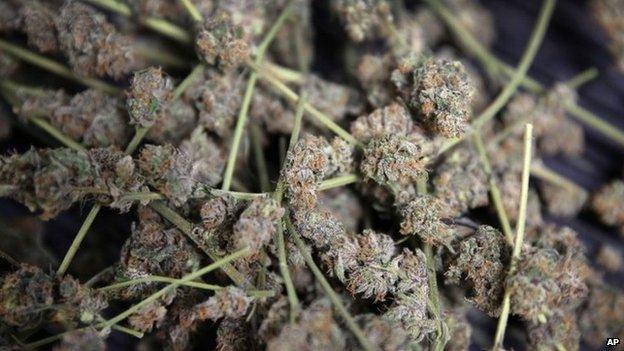UN body criticises US states' cannabis legalisation
- Published

Marijuana remains illegal under federal law in the US
A UN illegal drugs body has criticised 2012 moves in two US states to legalise recreational use of marijuana.
In a new report, the International Narcotics Control Board urged the US federal government to ensure anti-drug treaties were "fully implemented on the entirety of its territory".
It also said Afghanistan's response to record levels of land being used to produce opium poppies was lacking.
The board also warned that use of the drug ecstasy could rise in Europe.
The International Narcotics Control Board (INCB) was established in the 1960s to monitor UN nations' adherence to treaties on the control of narcotic drugs.
Broken treaty
In the group's latest report, external, INCB president Raymond Yans said that the organisation remained concerned about initiatives around the world which aimed to legalise the recreational use of cannabis.
He said new laws approved by voters in 2012 in two US states, Colorado and Washington State, "contravene the provisions of the drug control conventions, which limit the use of cannabis to medical and scientific use only".
“INCB urges the government of the United States to ensure that the treaties are fully implemented on the entirety of its territory.”

Precursor ingredients used to create ecstasy (MDMA) were found in increasing amounts across Europe
The group also had concerns over moves to change cannabis laws in Uruguay.
The report noted law enforcement agencies across Europe had seen a rise in suburban cannabis operations in which ordinary homes are converted to secret indoor farms.
Ecstasy 'comeback'
The INCB warned it was "seriously concerned" that Afghanistan needed to do more to stop people farming opium poppies.
Increased cultivation over three years has led to a record level of land dedicated to the crop, despite a national eradication campaign.
"This situation seriously endangers the aims of the international drug control treaties," said the report, adding the situation would not improve "unless substantial, sustainable and measurable progress is made by the government in anti-drug trafficking, alternative development and drug demand reduction".
The report said drug abuse in western and central Europe was either stabilising or declining.
But it warned that drug enforcement agencies had been uncovering increasing amounts of "precursor" chemicals used to produce ecstasy, suggesting the drug was "making a comeback".
- Published11 December 2013
- Published23 October 2013
- Published9 January 2014
- Published30 January 2014